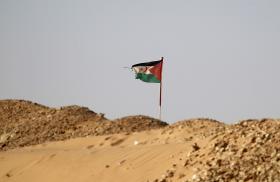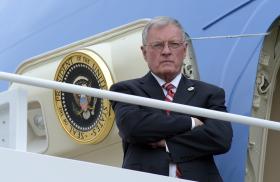
- Policy Analysis
- Fikra Forum
The IMF’s Lebanon Framework: Balancing State Debt with Depositor Rights

So far, the proposals presented to Lebanon’s central bank risk prolonging rather than solving the country’s financial and economic woes.
As Lebanon faces multiple challenges with economic and financial recovery from the country’s 2019 economic collapse, two interconnected issues remain particularly controversial: recovering the money of Lebanese who lost access to their bank deposits and holding those responsible for squandering their money accountable. Many insist on placing the blame on the Lebanese banking sector, thereby absolving current and former government officials of their role in swindling account holders. This is the narrative preferred by Hezbollah and its allies, who provided the political cover for the culture of corruption that eventually led to economic collapse.
The new government is negotiating a reform package with the IMF, which presents a great opportunity to hold officials and politicians accountable. However, discussions do not seem to be moving in the right direction. Rather than focusing on accountability, the IMF, like other international lenders, appears to be focused primarily on minimizing the indebtedness of its prospective client—in this case, the Lebanese state—at the expense of depositors and the central bank.
Stalemate over State Assets
A proposal circulating in Beirut’s corridors of power is at the heart of the controversy: the sale of a portion of the gold reserves of Banque du Liban, Lebanon’s central bank. Policymakers have focused on these reserves because the rising price of gold has made it the best-performing asset the central bank holds. However, the reserves are currently valued at $33 billion, while the bank’s overall debt is estimated at $80 billion. The IMF’s proposal to force BdL to liquidate a portion of its gold reserves is particularly contentious because those assets are widely understood to belong to the central bank and its depositors, not the state itself. Members of parliament who have met with the IMF say it has suggested that the Lebanese government refrain from repaying its $16.5 billion debt to the central bank—a sum the BdL has earmarked for direct repayment to bank depositors. The intention behind this tactic is not to bolster the government’s finances for the sake of depositors or the economy, but to ensure that Lebanon’s debt profile is lean enough for new IMF lending, thereby reducing the IMF’s own risk.
The fallout from this proposition threatens to undercut three core pillars of Lebanon’s financial architecture: the central bank, commercial banks, and ordinary depositors. As the central bank, BdL acts as the monetary authority responsible for issuing the Lebanese pound, managing interest rates, and stabilizing the exchange rate (historically through a currency peg). Meanwhile, commercial banks channel domestic savings and savings from the Lebanese diaspora into the economy by collecting deposits and extending loans to businesses, households, and the government.
Commercial banks, in addition to drawing billions in foreign currency deposits that fund Lebanon’s persistent trade deficit and public sector needs, play a key role in funding the state by buying large quantities of government bonds and placing funds in the central bank, effectively acting as the government’s primary creditor. Here, depositor confidence in these banks is essential: if they were to withdraw funds or stop sending remittances, the entire system would face liquidity stress. The deposits from Lebanese citizens and members of the diaspora are what allow banks to lend to the economy and to the government. Consequently, Lebanon’s financial model depends heavily on continuous inflows. If the Lebanese government failed to honor its obligations and commercial banks and depositors were left to pick up the losses of its $16.5 billion debt, the commercial banking sector would almost certainly collapse.
The IMF’s approach is dangerous not only because it ensures the crippling of the formal banking sector, but also because it reinforces Lebanon’s cash economy—a shadow financial system now largely controlled by the so-called “Shia duo,” Amal and Hezbollah. With depositors locked out of their accounts and banks effectively paralyzed, cash transactions dominate the market, giving these groups even greater leverage over trade, taxation, and currency exchange. Economists warn that this type of situation entrenches corruption, strengthens parallel power structures, and weakens any prospect for a return to formal economic governance.
As the country prepares for next year’s elections, the debate in parliament is expected to intensify. The focus is no longer squarely on the plan to restructure the banking sector—whose broad outlines the central bank has already presented, including removing irregular claims from its balance sheet and committing to repaying deposits in cash and securities. The central question now is, Who pays the price for restructuring, and who funds the recovery? The IMF apparently advocates a model in which the state—its potential debtor—bears no responsibility for past actions and leaves the burden of cleanup to the central bank, commercial banks, and ultimately, depositors.
Bridging the Gap
The sense of deja vu in Lebanon is palpable, evoking memories of the 2020 banking crisis, when mismanagement and public sector profligacy resulted in the loss of some $100 billion. As of this writing, no Lebanese government official has been prosecuted for what amounted to the state-sanctioned theft of money from account holders who were compelled to provide loans to the government. This remains fresh in the memory of Lebanese citizens. Moreover, BdL’s gold reserves are protected by Law no. 42/1986, which requires parliamentary legislation to authorize any sale. Regardless of whether the Lebanese state accepts the proposal or BdL succumbs to pressure from the IMF, the government is still obligated under Article 113 of the Code of Money and Credit to replenish any deficit at the BdL. Reportedly, the government, under Article 113, owes $14.9 billion in addition to the $16.5 billion that is already owed to BdL. The IMF, therefore, is pressuring the Lebanese Finance Ministry not to accept this debt while simultaneously pressuring BdL to sell its gold reserves, in contravention of Lebanese law. BdL provided the IMF with evidence that this debt stems from money borrowed by the government, but the IMF has refused to accept it.
To make up the difference, BdL has explored several avenues that do not require it to sell its reserves. One such proposal is for it to “sweat” its gold reserves by finding ways to generate income from them without selling. This would allow the bank to leverage its reserves by digitizing them—through tokenization or stablecoining the gold—and then leasing them while still retaining ownership. A total of 1 percent of BdL’s gold reserves—which are valued at more than $33 billion—could yield $350 million to help produce the liquidity needed to make Lebanese depositors whole. In a separate effort, BdL has even offered to accept repayment of the government’s $16.5 billion debt in the form of a perpetual bond at 2 percent interest and in the form of proceeds from any future privatizations. This would ease the debt sustainability level that the IMF has long touted as its chief concern in lending to Lebanon. Still, the IMF has remained obdurate.
There are, however, other ways for the Lebanese state to repay its debt that do not pose such a threat to the country’s financial system. For example, privatizing Lebanon’s telecom sector could unlock significant economic and fiscal benefits at a time when the country is struggling with a severe financial crisis. The state-owned telecom companies have long been criticized for inefficiency, high prices, and poor service, partly due to political interference and weak investment in infrastructure. Privatization could attract foreign and domestic capital, enabling modernization of networks and improved service reliability. It would also reduce the burden on public finances by cutting operational losses and generating immediate revenue from the sale of assets—funds that could be used for debt reduction or social spending. Moreover, opening the sector to competition could lower costs for consumers and businesses, stimulate digital entrepreneurship, and support broader economic growth. For Lebanon, where telecom revenues have historically been a major source of government income, privatization could shift the model from rent extraction to innovation-driven development.
The Lebanese state could also raise funds by modernizing customs collections. Despite recent improvements, the current customs administration still faces serious challenges. Under-invoicing, bribery, and preferential treatment that allows many goods to bypass full taxation are commonplace. This results in significant revenue leakage for the state. Moreover, the system is fragmented and outdated: political interference and patronage networks distort enforcement, as certain political or sectarian groups exert influence over ports and border crossings, undermining uniform application of the law.
The Path Forward
Rather than absolving the government of responsibility for Lebanon’s financial crisis and saddling depositors with losses, the IMF should allow Lebanese institutions to address their own debt crisis. The Lebanese state, BdL, and commercial banks should forge ahead with a compromise solution that prioritizes repayment of regular claims (legitimate deposits) after purging irregular claims from the banks’ balance sheets. These institutions have, in fact, hired experienced advisors with a strong track record of success in this domain. The IMF could then discuss a staff-level agreement with the Lebanese state based on fiscal discipline and restructuring of public finances, mirroring its strategy in Argentina.
For now, the central bank seems to be exercising restraint, engaging in delicate negotiations with the government and the IMF. But the patience of Lebanese who lost access to their bank deposits is wearing thin as their country’s financial crisis deepens. If the IMF forces such a plan on the Lebanese government, it would wipe out depositors’ money and could produce a populist backlash that devolves into mass protests. Widespread unrest could destabilize Lebanon’s fragile political environment and would hinder the government’s ability to implement any reforms at all. A weakened government, observers note, would ultimately undermine the very stability and reform the IMF claims to support.


